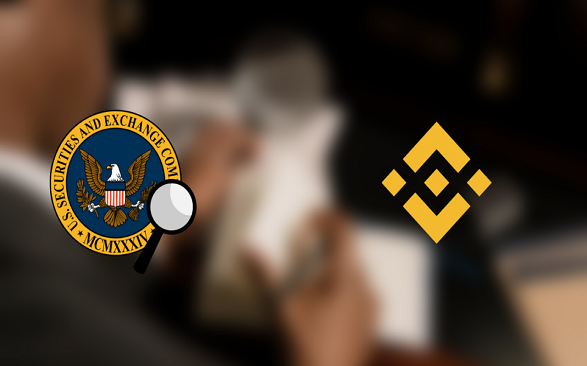Edison Irabor
In what appears to have been coming for some time, the U.S SEC finally sued Binance this week. It also joined Changpeng Zhao (“Zhao” or “CZ”), one of the most powerful founders in the crypto industry. If the U.S SEC’s enforcement action and accompanying language is anything to go by, the crypto industry is in for a real fight. Why exactly has the U.S. SEC sued the biggest crypto exchange in the globe as well as its Founder & CEO?
Binance entities and Founder Changpeng Zhao (“Zhao” or “CZ”) are facing 13 charges by the United States Securities and Exchange Commission (U.S SEC). The charges include “operating unregistered exchanges, broker-dealers, and clearing agencies; misrepresenting trading controls and oversight on the Binance.US platform; and the unregistered offer and sale of securities”.
According to the U.S SEC, Binance.com and Binance.US operated as exchanges, brokers, dealers, and clearing agencies, earning at least $11.6 billion in revenue from, among other sources, transaction fees from U.S. customers, since at least July 2017.
The Allegations against Binance and CZ
First, the SEC alleges that Binance and CZ “publicly claimed that U.S. customers were restricted from transacting on Binance.com” when “in reality”, both Binance and CZ “subverted their own controls to secretly allow high-value U.S. customers to continue trading on the Binance.com platform”.
Second, the SEC alleges that “while Zhao and Binance publicly claimed that Binance.US was created as a separate, independent trading platform for U.S. investors, Zhao and Binance secretly controlled the Binance.US platform’s operations behind the scenes”.
Third, the SEC also alleges that Zhao and Binance “exercise control of the platforms’ customers’ assets, permitting them to commingle customer assets or divert customer assets as they please, including to an entity Zhao owned and controlled called Sigma Chain”.
Fourth, the SEC’s further alleges that BAM Trading and BAM Management US Holdings, Inc. (“BAM Management”) “misled investors about non-existent trading controls over the Binance.US platform. While that was going on, “Sigma Chain engaged in manipulative trading that artificially inflated the platform’s trading volume”.
Fifth, the SEC alleges that Binance entities and CZ “concealed the fact that it was commingling billions of dollars of investor assets and sending them to a third party, Merit Peak Limited, that is also owned by Zhao”.
Sixth, apart from the allegations of nondisclosure, comingling of funds, etc, the SEC had also charged Binance entities and CZ of violating “critical registration-related provisions of the federal securities laws” as follows:
- Binance and BAM Trading with operating unregistered national securities exchanges, broker-dealers, and clearing agencies;
- Binance and BAM Trading with the unregistered offer and sale of Binance’s own crypto assets, including a so-called exchange token, BNB, a so-called stablecoin, Binance USD (BUSD), certain crypto-lending products, and a staking-as-a-service program; and
- Zhao as a control person for Binance’s and BAM Trading’s operation of unregistered national securities exchanges, broker-dealers, and clearing agencies.
Read also: Binance-branded BUSD stablecoin to be phased out— CZ
Read also: Introduction to Stablecoins: USDT, USDC, and BUSD
“A web of deception, conflicts of interest, lack of disclosure, and calculated evasion of the law”, says U.S SEC Chair Gary Gensler
U.S SEC Chair Gary Gensler accused the Binance entities and CZ of engaging “in an extensive web of deception, conflicts of interest, lack of disclosure, and calculated evasion of the law”.
Also, SEC alleges that “Zhao and Binance misled investors about their risk controls and corrupted trading volumes while actively concealing who was operating the platform, the manipulative trading of its affiliated market maker, and even where and with whom investor funds and crypto assets were custodied”.
Further, SEC alleges that Binance and CZ “attempted to evade U.S. securities laws by announcing sham controls that they disregarded behind the scenes so that they could keep high-value U.S. customers on their platforms”.
As far as Gurbir S. Grewal, Director of the SEC’s Division of Enforcement, is concerned, “Zhao and the Binance entities not only knew the rules of the road, but they also consciously chose to evade them and put their customers and investors at risk – all in an effort to maximize their own profits”. He continued, “By engaging in multiple unregistered offerings and also failing to register while at the same time combining the functions of exchanges, brokers, dealers, and clearing agencies, the Binance platforms under Zhao’s control imposed outsized risks and conflicts of interest on investors. Those risks and conflicts are only heightened by the Binance platforms’ lack of transparency, reliance on related-party transactions, and lies about controls to prevent manipulative trading. Despite their years-long efforts to not ‘be held accountable,’ today’s complaint begins the process of doing so.”
The Binance entities and CZ are facing charges for:
- Operating an unregistered exchange, broker, and clearing agency;
- Involving in unregistered offer and sale of crypto assets, including BNB, BUSD, and crypto-lending products known as “Simple Earn” and “BNB Vault; and
- Failure to restrict U.S. investors from accessing Binance.com;
- Misleading investors
The U.S SEC has warned that “[t]he public should beware of investing any of their hard-earned assets with or on these unlawful platforms”.
Meanwhile, Binance has publicly responded to the U.S SEC’s enforcement action, describing it as “regulation by enforcement” which is unfortunate, “unilateral”, “misguided”, and an “overreach” which Binance is “prepared to fight … to the full extent of the law”.
U.S SEC v. Binance: A Two-Way Traffic?
Justice, they say, is a two-way traffic. From an umpire point of view, both the U.S. SEC’s and Binance’s conducts will not only be subjected to a judicial periscope but also a microscopic one. On the one hand, the accusation of “regulation by enforcement” against the U.S. SEC, examining closely the regulator’s approach to its work in the crypto industry may be decisive. On the other hand, the allegation of violation by design against Binance, examining Binance’s approach to its operations since inception may also be decisive. Either way, it is worth considering whether courtrooms, and not roundtables, are the place to be.
Read also: Binance accuses the U.S SEC of aiming to unilaterally define crypto market structure.
Discover more from Crypto Asset Buyer
Subscribe to get the latest posts sent to your email.




